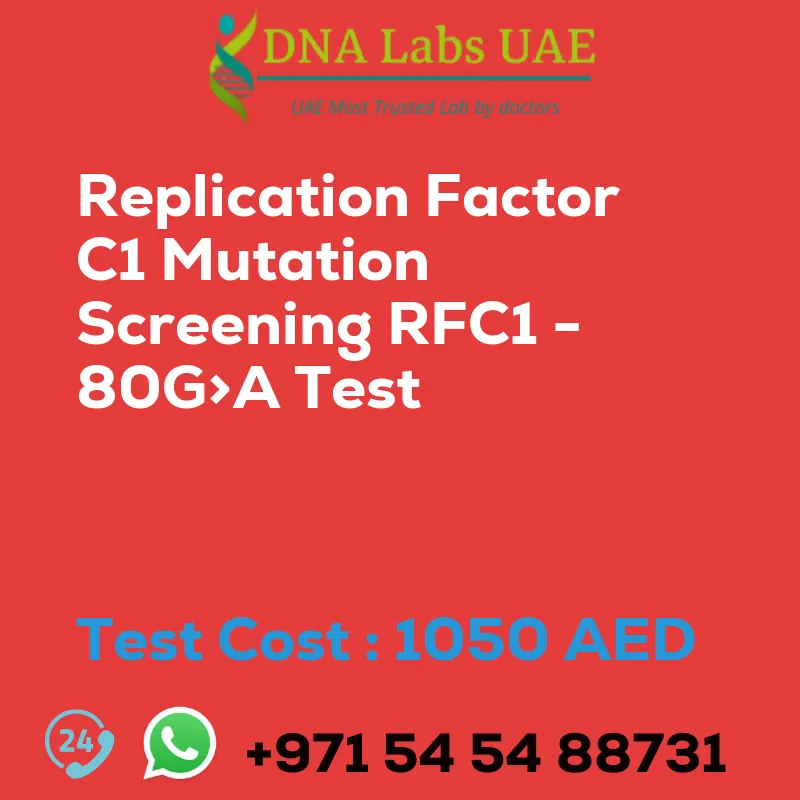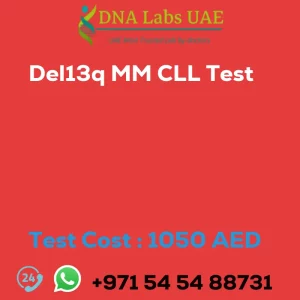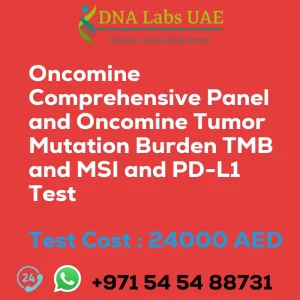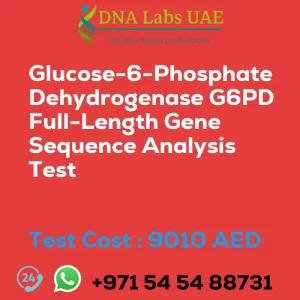Replication Factor C1 Mutation Screening RFC1 – 80G>A Test
Components: EDTA Vacutainer (2ml)
Price: 1050.0 AED
Sample Condition: Peripheral blood
Report Delivery: 3-4 days
Method: End Point PCR + RFLP
Test Type: Genetics
Doctor: Oncology
Test Department:
Pre Test Information: Replication Factor C1 Mutation Screening (RFC1 – 80G>A) can be done with a Doctor’s prescription. Prescription is not applicable for surgery and pregnancy cases or people planning to travel abroad.
Test Details
The Replication Factor C1 Mutation Screening (RFC1 – 80G>A) is a genetic test that detects a specific mutation in the RFC1 gene. This mutation involves a change in the DNA sequence at position 80, where a guanine (G) is replaced by an adenine (A).
The RFC1 gene encodes for a protein that plays a crucial role in DNA replication, which is the process by which cells make copies of their DNA during cell division. Mutations in the RFC1 gene can disrupt this process and lead to errors in DNA replication.
The RFC1 – 80G>A mutation has been associated with an increased risk of various diseases, including cancer and autoimmune disorders. Therefore, this genetic test is used to identify individuals who carry this mutation and may be at higher risk for developing these conditions.
The test is typically performed using a sample of blood or saliva, from which DNA is extracted. The DNA is then analyzed using a variety of techniques, such as polymerase chain reaction (PCR) and DNA sequencing, to determine whether the RFC1 – 80G>A mutation is present.
If the mutation is detected, individuals may be advised to undergo further medical screenings or take preventive measures to reduce their risk of developing associated diseases. Additionally, this information can be valuable for family planning, as the mutation can be inherited from parents to children.
It is important to note that the presence of the RFC1 – 80G>A mutation does not guarantee that an individual will develop a specific disease. Genetic testing should always be interpreted in conjunction with other clinical and family history information to provide a comprehensive assessment of an individual’s risk.
| Test Name | Replication Factor C1 Mutation Screening RFC1 – 80G>A Test |
|---|---|
| Components | EDTA Vacutainer (2ml) |
| Price | 1050.0 AED |
| Sample Condition | Peripheral blood |
| Report Delivery | 3-4 days |
| Method | End Point PCR + RFLP |
| Test type | Genetics |
| Doctor | Oncology |
| Test Department: | |
| Pre Test Information | Replication Factor C1 Mutation Screening (RFC1 – 80G>A) can be done with a Doctors prescription. Prescription is not applicable for surgery and pregnancy cases or people planing to travel abroad. |
| Test Details |
The Replication Factor C1 Mutation Screening (RFC1 – 80G>A) is a genetic test that detects a specific mutation in the RFC1 gene. This mutation involves a change in the DNA sequence at position 80, where a guanine (G) is replaced by an adenine (A). The RFC1 gene encodes for a protein that plays a crucial role in DNA replication, which is the process by which cells make copies of their DNA during cell division. Mutations in the RFC1 gene can disrupt this process and lead to errors in DNA replication. The RFC1 – 80G>A mutation has been associated with an increased risk of various diseases, including cancer and autoimmune disorders. Therefore, this genetic test is used to identify individuals who carry this mutation and may be at higher risk for developing these conditions. The test is typically performed using a sample of blood or saliva, from which DNA is extracted. The DNA is then analyzed using a variety of techniques, such as polymerase chain reaction (PCR) and DNA sequencing, to determine whether the RFC1 – 80G>A mutation is present. If the mutation is detected, individuals may be advised to undergo further medical screenings or take preventive measures to reduce their risk of developing associated diseases. Additionally, this information can be valuable for family planning, as the mutation can be inherited from parents to children. It is important to note that the presence of the RFC1 – 80G>A mutation does not guarantee that an individual will develop a specific disease. Genetic testing should always be interpreted in conjunction with other clinical and family history information to provide a comprehensive assessment of an individual’s risk. |








